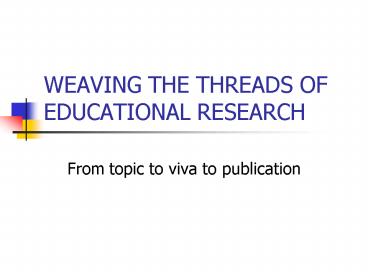WEAVING THE THREADS OF EDUCATIONAL RESEARCH - PowerPoint PPT Presentation
1 / 12
Title:
WEAVING THE THREADS OF EDUCATIONAL RESEARCH
Description:
Choosing your topic what do you want to do and why? ... Webs, quilts and flowcharts. More of a patchwork quilt than a neatly woven fabric ... – PowerPoint PPT presentation
Number of Views:84
Avg rating:3.0/5.0
Title: WEAVING THE THREADS OF EDUCATIONAL RESEARCH
1
WEAVING THE THREADS OF EDUCATIONAL RESEARCH
- From topic to viva to publication
2
The hardest part??
- Choosing your topic what do you want to do and
why? - Deciding on your research questions and
thinking about where they come from - Getting focused, making it do-able ( doing 1
doctorate instead of 3)
3
Threads what threads?
- Some threads are very practical time, gaining
access, sampling - Some are philosophical epistemology, ontology,
methodology - Some are about YOU ( and other people)
refleXivity, reflectivity, ethics
4
BRIEF DIVERSION 1 .. the 3 ologies
- E what do you claim to know? How do you know
this? What is knowledge anyway? - O what do you believe exists? E.g. race/racism,
class, causality - M why did you do what you did? Why this
approach? Why these methods and not others?
5
Webs, quilts and flowcharts
- More of a patchwork quilt than a neatly woven
fabric - Not a flow chart, more a spiders web
- Appearances can be deceptive..
6
Is the dissertation a fraud? (Medawar,
1963)
- The final product looks linear Abstract, Intro,
Lit. Review, Methodology and Methods, Findings
and Discussion, Conclusions and Recommendations - But. The process is not linear but cyclical/
iterative ( see my green book)
7
Weaving the threads coherence, articulation,
linkage between.
- Research questions and methods/ methodology (
ask how am I going to address each one? Is each
one answerable in my lifetime.. Or answerable at
all?) - Knowledge claims (conclusions) and your evidence
for them - Your study, located in the existing literature
(your brick in the wall) - Implications for practice/policy/ theory linked
with the literature review and your own data and
analysis
8
DIVERSION 2 Help is at hand
- Your supervisor ?? Focusing, cajoling, feeding
back, . Others please add! - Critical friends, peers, networks, conferences
- Writing treat it as a form of thinking (Laurel
Richardson)
9
The ultimate goal
- Doctorateness the Holy Grail, largely
undefined, tacit ( thereof which many do not
speak, thereof we should not remain silent
sorry Wittgenstein) - Look at the tangible products of the doctorate
the written dissertation and the viva - The 3 Cs Coherence, clarity, criticality,
contribution (a thesis) - What about the O word originality?
10
The Viva voce ( live voice)
- A good viva should discuss all the threads and
how they come together - see my list of questions
11
The final step publication, spreading the word
- Research is not complete without dissemination
- Remember Your dissertation is a publication -
paper and/ or electronic (it may be your
first, maybe not) - Journals academic, professional?
- A book? ( less likely perhaps)
- Conference presentations, the press.
12
Further reading?
- My summary of Viva questions and Ways of being
original available on request, free of charge! - j.wellington_at_sheffield.ac.uk
- Wellington, J ( 2003) Getting Published London
Routledge - Is the scientific paper a fraud? , Medawar, P (
1963)































